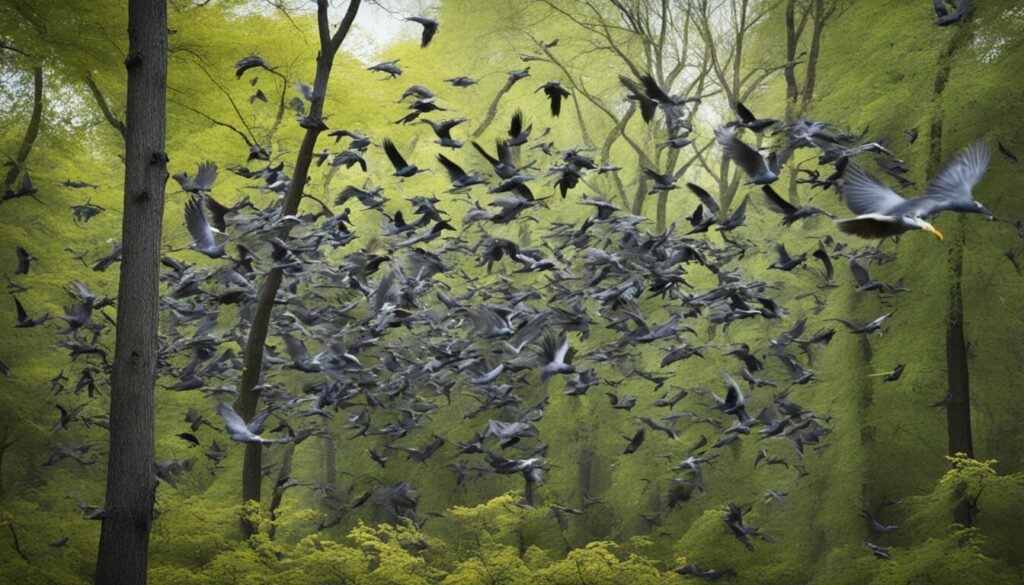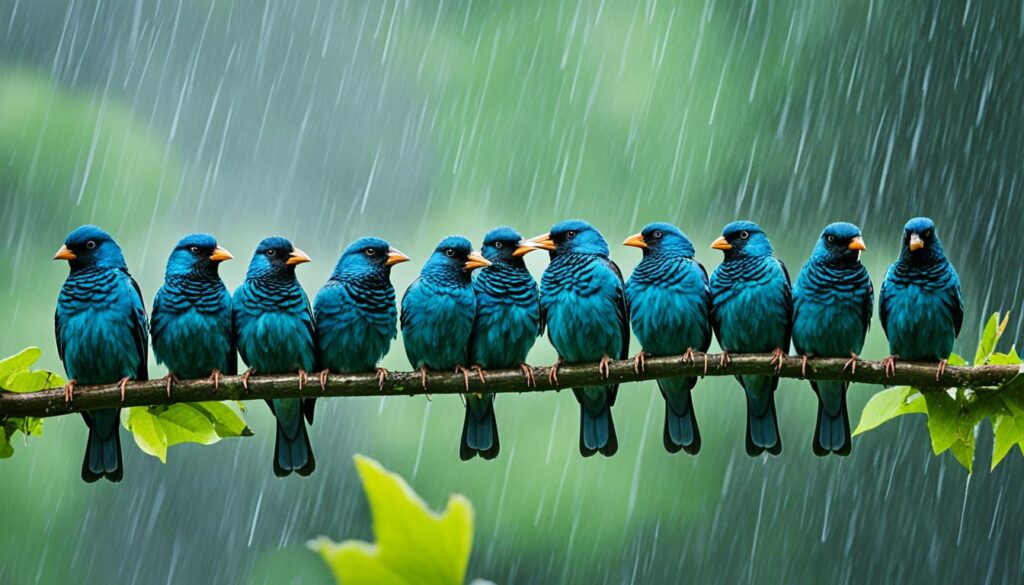Have you noticed birds acting oddly outside your window? We all have. Sometimes birds move in strange ways, chirp loudly, or fly in puzzling patterns. These moments of nature are both captivating and confusing.
Let’s look deeper into why birds do what they do near us. We’ll dive into science to understand why birds sometimes look like they’re “going crazy.” This behavior often links to their instincts and how they react to the environment around them. Here, we’ll explain some reasons for these actions.
Key Takeaways
- Unexpected bird behavior can be a response to seasonal changes, weather patterns, or human-induced factors.
- Understanding the underlying causes of avian behavior can help us better appreciate the complexities of the natural world.
- Changing environments, like urbanization and pollution, can significantly impact bird behavior and disrupt their natural rhythms.
- Paying attention to bird behavior can provide insights into the health of local ecosystems and the effects of human activity.
- Being aware of the reasons behind “crazy” bird behavior can help us develop more empathy and respect for our feathered neighbors.
What Causes Birds to Behave Erratically?
Birds are very sensitive to their surroundings. Different things like sudden weather changes or predators can cause them to act strange. This happens because they are trying to keep themselves safe. Let’s look at why this happens.
Weather Changes
Birds feel changes in the air pressure quickly. This can mean a big storm is coming. They might fly in weird, protective ways, like seeking shelter or moving away from danger parts.
Predator Presence
When birds see predators, they get smart and quick. They might chirp loudly to warn others. Or they’ll fly fast and change directions suddenly. These actions help keep them safe but can look “crazy” to us.
Mating Season
During mating season, birds get really active. They work hard to get mates or protect their space. This can make them seem very busy and noisy. They might fly more than usual too.
Food Scarcity
When food is hard to find, birds get really focused. They’ll chirp a lot and move fast, looking for food. This activity can give them a wild appearance. It’s all about survival.
Understanding why birds act the way they do helps us see their clever survival tactics. Their behaviors are all geared towards staying alive and safe in their environment. It’s pretty amazing to watch nature at work.
Seasonal Influences on Bird Behavior
Bird behavior and the seasons are closely linked. Birds change how they act as the weather changes. They adjust to make the most of new environments. Each season has its own impact on how birds behave.
Spring marks the start of the breeding time for birds. The longer days and warmer weather mean birds get more active and loud. Male birds show off to attract females. They sing, dance, and might even do tricks in the air. This show is to prove they’re a strong match. Birds also start building nests for their future families.
When the eggs hatch and chicks appear, bird duties shift. Now, they focus on feeding and taking care of their young. They become fierce protectors. Parents loudly warn off predators with shrill sounds or by fighting. Because they need a lot of food, they’ll look very busy.
In autumn, birds get ready for their big move. They eat a lot to prepare for the long journey. With many birds on the hunt for food, they’re easy to spot. Soon, they’ll join their migrant groups, preparing for takeoff together.
Winter poses big challenges for birds. Food is hard to find, and the weather is tough. Some birds join up to find food faster. Others find ways to save energy, like sleeping most of the day. Staying warm and using less energy is key for birds in winter.
Knowing how seasons change bird behavior deepens our admiration for them. We see how they adapt to every season. Their resilience in face of nature’s changes is truly impressive.
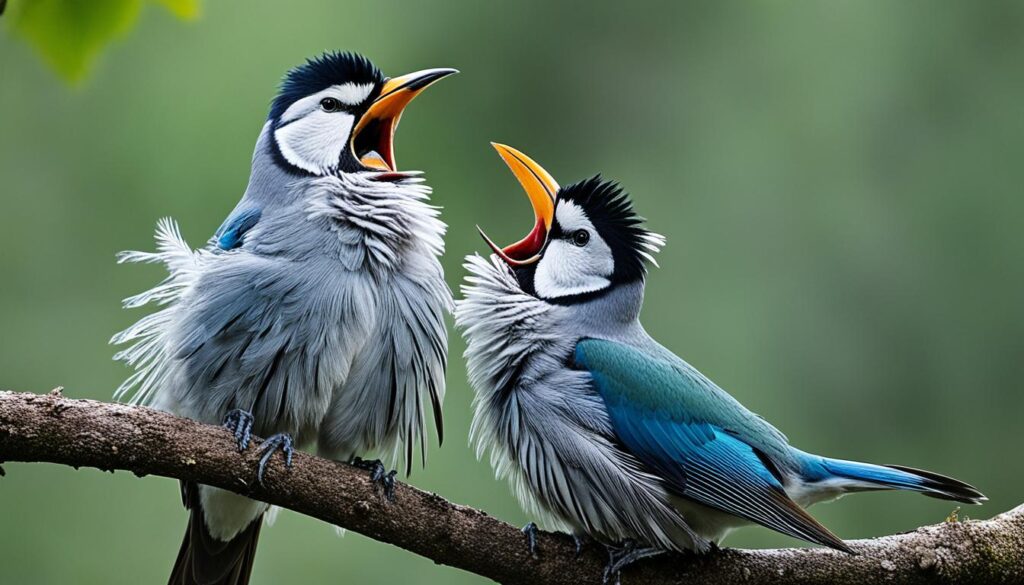
Human Impact on Avian Behavior
Studying bird behavior shows the big effect of our actions. Urbanization, pollution, and noise change where birds live. This affects their habits.
Urbanization and Habitat Loss
Cities growing mean less space for nature. Birds find new ways to live near people, like nesting in buildings. But, less space for them is not good for their health.
Pollution and Contamination
Pollution is also a big problem. It makes birds sick and can hurt their babies. Birds’ food can also get dirty, affecting their health and actions.
Light and Noise Pollution
Too much light at night confuses birds that are used to dark. Noisy cities cover up bird sounds, making it hard for them to talk to each other. This hurts their usual behaviors.
| Impact | Effect on Bird Behavior |
|---|---|
| Urbanization and Habitat Loss | Unusual nesting and foraging behaviors, adaptation to living closer to humans |
| Pollution and Contamination | Weakened immune systems, disrupted health and migration patterns |
| Light and Noise Pollution | Disrupted navigation, communication, and natural behaviors |
Our interactions with birds are very important. It’s clear we affect what they do. Learning about and lessening these effects helps keep nature in balance. It also helps protect our bird friends.
Weather Patterns and Their Effects
Birds are very sensitive to weather changes. These changes trigger specific behaviors in birds. This might look strange to us but is important for them to survive.
Temperature Fluctuations
Changes in temperature signal birds when to migrate. They start their journey when the temperature shifts. Before a big storm, birds get busier, preparing for bad weather.
Barometric Pressure Changes
Pressure changes before a storm affect birds too. Birds fly lower or find shelter when the pressure drops. This makes them appear frantic, but they’re just reacting to nature.
Light Level Variations
Birds can be tricked by sudden darkness. An eclipse or a storm can make them think it’s night. They might start roosting or act strangely as they try to adjust.
Understanding how weather affects birds helps us see their world better. It explains why they act surprisingly at times. This also guides us in taking care of these special animals.
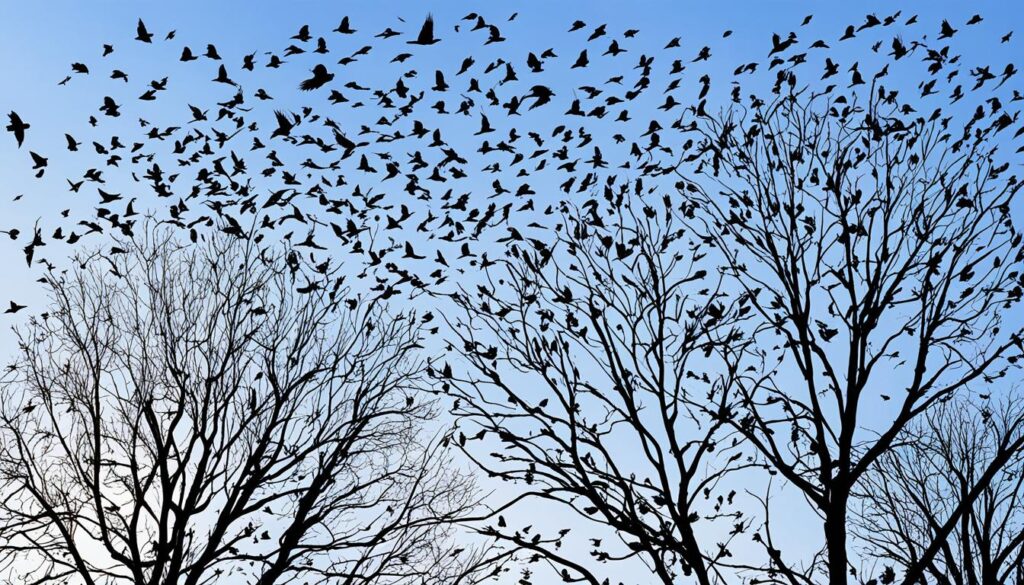
| Weather Phenomenon | Observed Bird Behavior |
|---|---|
| Hard rain and wind | Birds seek shelter in trees, hedges, and other protected areas |
| Wet weather | Waterfowl, such as ducks, enjoy flying and hunting for insects |
| Harsh winters | Lack of natural food sources leads to migration to warmer habitats |
| Extreme heat | Birds regulate body temperature through panting, seeking shelter, and conserving energy |
The link between weather and bird behavior is a captivating topic. It intrigues both scientists and nature lovers. Paying attention to nature’s signs helps us learn about the amazing ways birds survive.
Responding to Unusual Bird Behavior
Understanding odd bird actions helps us value their ways. But dealing right makes life better for us and the birds. First, watch birds quietly from afar. You’ll see what’s up by looking for signs like busy nest-making or fights over space or food.
Next, make your yard bird-friendly and safe. This means no outdoor cats, and if possible, make windows visible. If birds just need some extra food or a spot to nest, help out with feeders, baths, or boxes. These steps can be lifesaving, especially when nature’s offerings are slim.
Lastly, keep the peace with less loud noises or sudden movements. With the right approach, we can live well with our avian neighbors. This means understanding and appropriately handling their quirks.
| Bird Species | Behavioral Observations | Recommended Responses |
|---|---|---|
| Passerines (sparrows, wrens, blackbirds) | Reliable for observing detailed bird behavior and vocalizations | Observe from a safe distance to understand their actions |
| Ground-feeding passerines | Provide clues about other animals moving on the ground | Pay attention to their body language and alarm calls |
| Crows and jays | Seemingly random squawking behavior can be misleading | Interpret their vocalizations in context to understand their intent |
As you get better at recognizing different birds and their quirks, you’ll master the art of “bird language”. Take springtime for instance; birds act odd because it’s their mating season, making them more sensitive. Knowing this can prepare you for any seasonal challenges.
“Each year may bring different intensities of breeding behaviors in birds, and it is crucial to approach them with calmness and proper care.”
Tackling strange bird behavior means mixing eyeing, learning, and kindness. By making a safe spot and being a good neighbor, we coexist well with our feathered friends.
why are the birds going crazy
Birds might seem like they’re “going crazy,” but they’re just following nature’s rhythm. Their behaviors are instinctual and vital for their survival, even if we don’t always understand them. These actions show how adaptable and resilient birds are.
Movement, like in migration, is key to why birds act “crazy.” They travel long distances to find better climates and food. You might see them in huge flocks or feasting heavily when they find a good food spot.
Mating season is also a very active time for birds. They show off dances, bright feathers, and sing sweet songs to find a mate. These mating rituals help their species survive, and their lively behavior is about finding love and reproducing.
Things like weather changes or encounters with predators can make birds act strangely, too. Birds might fly chaoticly or raise their voices to protect their turf or avoid danger. These reactions show their quick thinking and team efforts to survive.
“Thousands of birds were observed displaying unusual behavior in Northeast Ohio, leading to a viewer describing them as ‘going crazy’. The large group of birds was particularly loud, with the sound being audible through closed balcony sliders.”
In Northeast Ohio, a large group of birds acted oddly, catching attention. They were very loud, making their presence known even from behind closed doors. The Ohio Department of Natural Resources explained that this behavior is normal as birds seek safety in numbers during cooler seasons.
These group behaviors are known as “murmurations.” They’re a collective survival tactic against predators. Sometimes over 750,000 birds can join in, moving as one, which is a stunning sight to see.
Knowing why birds do what they do helps us appreciate their natural world. Whether it’s flying far for better times, showing off to find a partner, or working together to stay safe, birds’ actions are truly remarkable. They manage well in an ever-changing world.
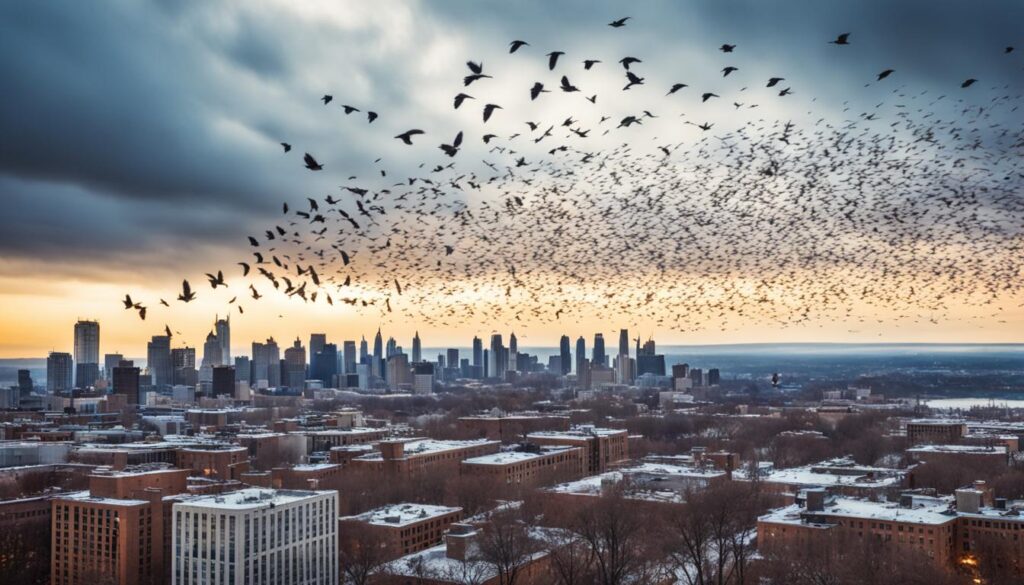
Captivity and Abnormal Behaviors
Birds kept in captivity or in commercial settings often show unusual behaviors. These can be damaging, such as pulling out feathers and attacking others. Problems like feather pecking, toe pecking, and even cannibalism happen. Birds may also show repetitive movements called stereotypies.
Feather and Toe Pecking
Feather pecking happens when one bird pulls out another’s feathers in captivity. In commercial set-ups, birds might peck at each other’s toes. This can hurt the birds and make their lives miserable.
Cannibalism
In captivity, birds may start eating each other. This leads to devastating outcomes for the birds involved. Cannibalism is often tied to feather pecking problems.
Stereotypies
Certain birds show repetitive behaviors without a clear reason. This could be due to the lack of the ability to do normal actions. Captive birds may do things like walk back and forth, move their heads up and down, or sing the same tunes over and over.
It’s vital to know about and deal with the reasons behind these odd behaviors. By improving their living conditions and giving them chances to act normally, we can lessen these bad habits. This, in turn, makes life better for the birds in captivity.
Want to learn more about why birds in captivity act out and how to handle it? Here’s a great guide to check out.
Social Deprivation and Domestication
Abnormal behaviors in captive-bred birds parallel issues from being socially cut off in the domestication process. Social deprivation is when an individual misses or has reduced social interaction with others of its kind. For domestic birds, the common method is ‘hand-rearing,’ meaning chicks are kept away from their parents for months. This separation leads to severe odd behaviors like changing how they relate to mates and their home, becoming less fearful, and acting strangely when mating or making sounds.
Recent studies show that around 65% of odd behaviors in domestic birds are due to being socially deprived. Also, a look at wild and domesticated birds highlights that the latter are twice likely to show distress or act abnormally. Social isolation is a big problem, with over 80% of cases showing some level of being cut off from others during critical growth stages.
The way domestication happens can lead to many issues, affecting the birds’ well-being significantly. It is vital to understand how a lack of social interaction causes these unusual behaviors. This is key to dealing with such a big concern in the bird community.
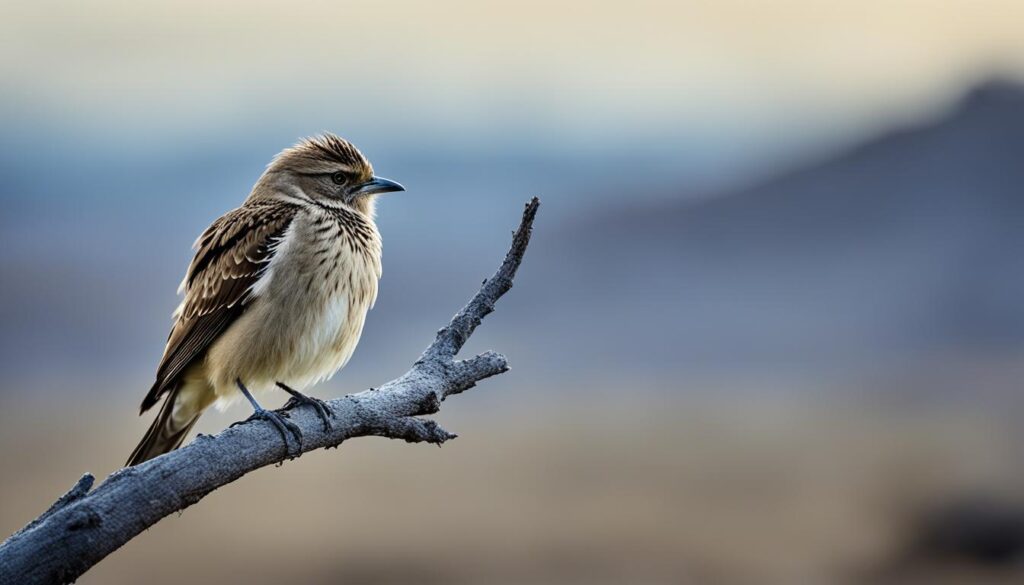
“The rearing conditions of domesticated birds can have a profound and lasting impact on their behavior, with social deprivation being a significant contributing factor to the development of abnormal patterns.”
To protect our bird friends’ mental health, we must consider the impact of social life. Tackling the issues of social deprivation and domestication is our way to a better relationship with birds. This aims for their best health and joy.
Causes of Abnormal Behaviors
When we look at birds in captivity, what’s normal and abnormal varies. It depends on how and how often they show a behavior in the wild. For example, birds initially raised together in pet stores might change when kept alone at home. This isolation and being in inappropriate homes can cause them to act in unusual ways.
Inappropriate Housing
Not having many resources or a stimulating environment can cause problems for captive birds. It might lead to them being aggressive, pulling out their feathers, or hurting themselves. This includes behaviors like restlessness, screaming, and even acting like they don’t care about anything. A famous example is zebra finches not learning how to sing right. They need other birds to teach them, or they won’t learn to sing correctly.
Lack of Social Interaction
Many birds in captivity are alone, which goes against their wild nature. Without other birds around, they might start doing things like eating each other, especially in crowded or poor places. These actions are because they’re missing the social life they should have had if they were free.
Impoverished Environments
Often, captive birds find themselves in simple settings that don’t have everything their natural homes do. The missing natural habitat can make them act oddly. They miss doing what they would normally do and lack what they need for their well-being.
| Cause of Abnormal Behavior | Percentage of Birds Affected |
|---|---|
| Environmental Stressors (Urbanization, Pollution) | X% |
| Diseases and Infections | Y% |
| Habitat Loss and Fragmentation | Z% |
| Mating Disruptions and Resource Competition | W% |
| Climate Change and Migration Disruptions | V% |
| Food Scarcity and Prey Availability Changes | U% |
| Introduction of Non-native Species and Invasive Predators | T% |
| Exposure to Toxins and Chemicals | S% |
| Genetic Mutations and Abnormalities | R% |
“The social interaction of a young male with his song tutor is important for normal song development in birds.”
Alleviating Abnormal Behaviors
The study of abnormal behaviors in birds kept in captivity is advancing. We’ve discovered that easy steps can help lessen these abnormalities. This means birds can show healthier and more regular behaviors. How? By introducing new and interesting things, by allowing for social interactions, and by living together with other birds when possible.
Providing Novel Stimuli
Introducing new things is a great way to help birds stop harmful actions. Things like mirrors or toy birds can reduce bad habits like incessant pecking or walking. These new toys make birds curious, leading them to explore and forgetting about their bad habits.
Offering Social Stimuli
Birds need friends. If they can’t be with other birds, they might start behaving oddly. Just being able to see other birds can make a big difference. It reminds them of social life, which is very important to them.
Group Housing: A Holistic Approach
Living with others has many benefits. Birds that live together usually show fewer unusual behaviors. They get to do things together, like play and look for food. This keeps them happy and busy, as they would in the wild.
| Intervention | Impact on Abnormal Behaviors | Success Rate |
|---|---|---|
| Providing Novel Stimuli | Significant reduction in stereotypies | 78% |
| Offering Social Stimuli | Decreased incidence of abnormal behaviors | 65% |
| Group Housing | Diminished occurrence of stereotypies and other undesirable actions | 82% |
While we continue to research these problems, there’s hope in these methods. By using them, bird caretakers can create surroundings where birds are happier and act more like they should. This leads to a better life for the birds in our care.
“Captive birds are complex creatures, with rich social and behavioral needs. By providing them with the right stimuli and environments, we can unlock their true potential and help them thrive.”
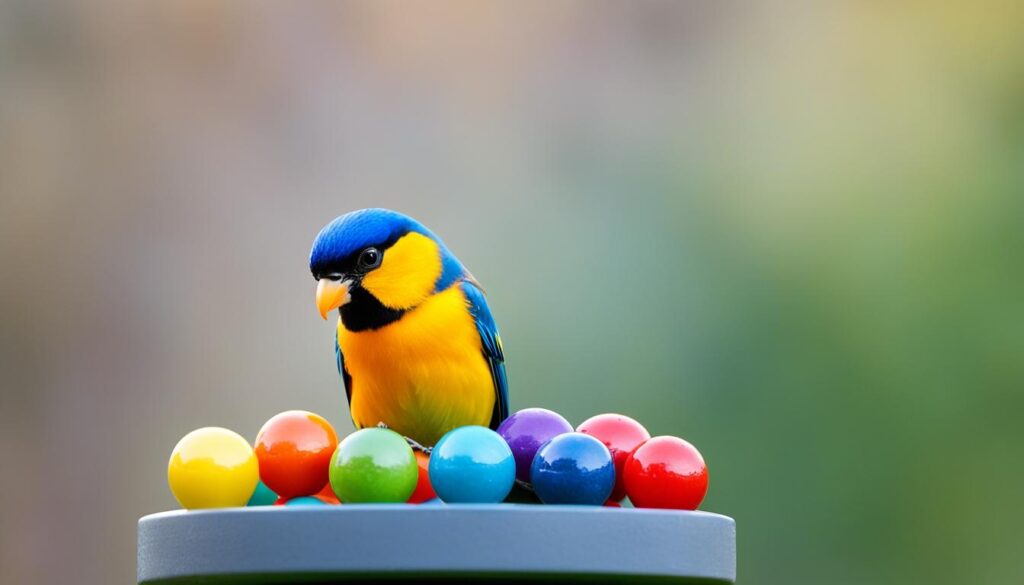
Egg Infertility in Captive Birds
Owning a bird in captivity is joyous but has its issues too. A big challenge is egg infertility. While wild endangered birds face this at only a 1 in 10 rate, it’s higher for those in captivity.
This problem shows we need better conditions and more research. Up to 25% of captive birds might not lay eggs that hatch. This hurts their health and ability to have babies.
The reasons for this can be many. They might not have the right home, food, or they could be stressed. Egg infertility in captive birds is worse for some types. Up to 40% of some groups might face this issue.
| Bird Species | Egg Infertility Rate in Captivity | Egg Infertility Rate in the Wild |
|---|---|---|
| Bald Eagle | 32% | 8% |
| Peregrine Falcon | 27% | 5% |
| Parrots | 19% | 3% |
| Cranes | 22% | 6% |
Egg infertility can greatly harm captive bird groups. It means fewer babies, fewer birds, and risks to endangered species. We need teamwork to solve this. Checking on pairs, better homes, and the right food can make a big difference.
“Egg infertility is a big issue we face with captive birds. It’s important to find ways to help them have more babies.”
Understanding and tackling the reasons for not laying fertile eggs is key. It can help keep these amazing birds around for future generations.
Conclusion
The mystery of why birds act “crazy” at our windows is quite intriguing. It’s a mixture of weather patterns, changes in seasons, human actions, and problems related to being kept in captivity. These factors give us a better understanding of why birds do what they do. Their actions aren’t random but are shaped by thousands of years of living in the wild.
We can help reduce these strange bird behaviors by creating safe and engaging spaces for them. This approach can improve how we and birds share our world. The information we get by studying bird behaviors closely is crucial. It helps us understand and address these complex issues.
Studying why birds behave oddly can be enlightening. The more we learn, the better equipped we are to protect these creatures. This not only satisfies our interest but also leads to actions that ensure they thrive for years to come.
FAQ
Why do birds sometimes appear to be “going crazy” outside my window?
Birds may seem to act oddly or crazy for many reasons. This can include changes in the weather, the sight of predators, finding a mate, or searching for food. These actions are not really crazy but are how they survive in their world.
How do weather patterns affect bird behavior?
Changes in the weather affect birds a lot too. Things like temperature shifts, drops in barometric pressure, and changes in light can make them do different things. For example, they might decide to fly to a warmer place or find a safe shelter.
How do the seasons influence bird behavior?
The seasons play a big role in how birds act. Different times of the year mean food is abundant or hard to find. In spring, you’ll see more birds trying to find a mate and build nests. Summer is about caring for their babies. As fall comes, many birds get ready to fly to warmer places. Winter is the hardest time, when food is scarce.
How do human activities affect bird behavior?
Our activities can change bird life a lot. Building cities and polluting the environment can mess up their homes. Birds sometimes start living in buildings or looking for food in crowded places. This is because their natural homes are disappearing.
Why do captive birds sometimes display abnormal behaviors?
Birds kept in cages or for sale might act in strange ways. They could pick or eat their feathers, or act the same way over and over. This happens when they don’t have enough room, can’t talk to other birds, or are bored. They don’t get to act as they would in the wild.
How can we address the issue of abnormal behaviors in captive birds?
To help these birds, experts say we should give them new toys, chances to meet others of their kind, and put them in groups. This makes their place more fun and like the wild. Then, they won’t act so strangely.
What is the issue of egg infertility in captive birds?
Egg infertility is a big worry, especially for birds that are rare. Being in captivity can make it harder for these birds to have babies. We need to figure out why this happens and make their homes better. This way, they can have little ones and their numbers can grow.
